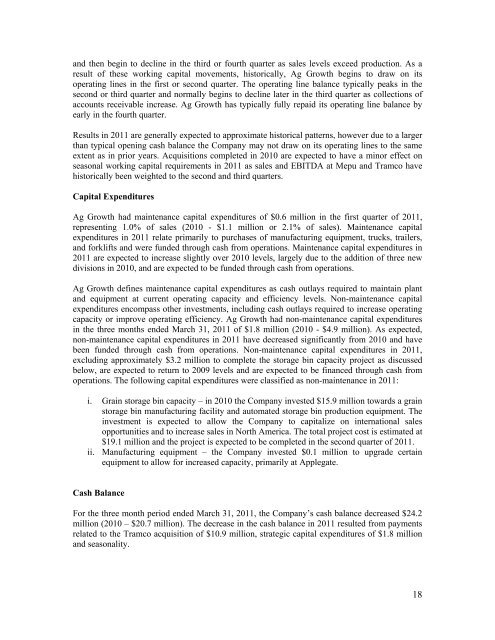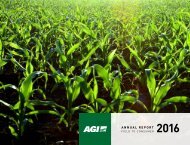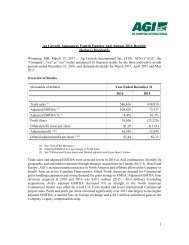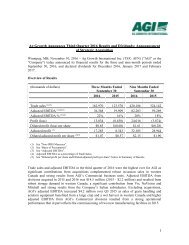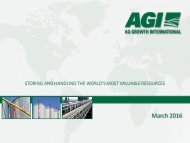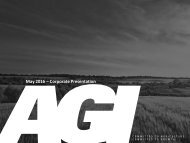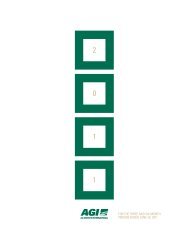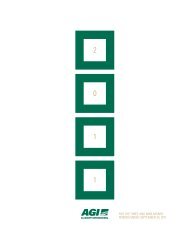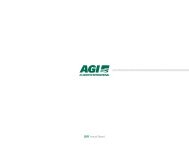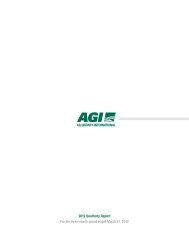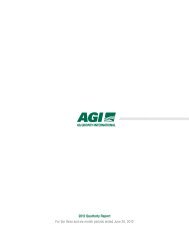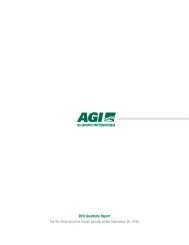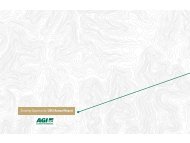Q1 Financial Report - 2011
You also want an ePaper? Increase the reach of your titles
YUMPU automatically turns print PDFs into web optimized ePapers that Google loves.
and then begin to decline in the third or fourth quarter as sales levels exceed production. As a<br />
result of these working capital movements, historically, Ag Growth begins to draw on its<br />
operating lines in the first or second quarter. The operating line balance typically peaks in the<br />
second or third quarter and normally begins to decline later in the third quarter as collections of<br />
accounts receivable increase. Ag Growth has typically fully repaid its operating line balance by<br />
early in the fourth quarter.<br />
Results in <strong>2011</strong> are generally expected to approximate historical patterns, however due to a larger<br />
than typical opening cash balance the Company may not draw on its operating lines to the same<br />
extent as in prior years. Acquisitions completed in 2010 are expected to have a minor effect on<br />
seasonal working capital requirements in <strong>2011</strong> as sales and EBITDA at Mepu and Tramco have<br />
historically been weighted to the second and third quarters.<br />
Capital Expenditures<br />
Ag Growth had maintenance capital expenditures of $0.6 million in the first quarter of <strong>2011</strong>,<br />
representing 1.0% of sales (2010 - $1.1 million or 2.1% of sales). Maintenance capital<br />
expenditures in <strong>2011</strong> relate primarily to purchases of manufacturing equipment, trucks, trailers,<br />
and forklifts and were funded through cash from operations. Maintenance capital expenditures in<br />
<strong>2011</strong> are expected to increase slightly over 2010 levels, largely due to the addition of three new<br />
divisions in 2010, and are expected to be funded through cash from operations.<br />
Ag Growth defines maintenance capital expenditures as cash outlays required to maintain plant<br />
and equipment at current operating capacity and efficiency levels. Non-maintenance capital<br />
expenditures encompass other investments, including cash outlays required to increase operating<br />
capacity or improve operating efficiency. Ag Growth had non-maintenance capital expenditures<br />
in the three months ended March 31, <strong>2011</strong> of $1.8 million (2010 - $4.9 million). As expected,<br />
non-maintenance capital expenditures in <strong>2011</strong> have decreased significantly from 2010 and have<br />
been funded through cash from operations. Non-maintenance capital expenditures in <strong>2011</strong>,<br />
excluding approximately $3.2 million to complete the storage bin capacity project as discussed<br />
below, are expected to return to 2009 levels and are expected to be financed through cash from<br />
operations. The following capital expenditures were classified as non-maintenance in <strong>2011</strong>:<br />
i. Grain storage bin capacity – in 2010 the Company invested $15.9 million towards a grain<br />
storage bin manufacturing facility and automated storage bin production equipment. The<br />
investment is expected to allow the Company to capitalize on international sales<br />
opportunities and to increase sales in North America. The total project cost is estimated at<br />
$19.1 million and the project is expected to be completed in the second quarter of <strong>2011</strong>.<br />
ii. Manufacturing equipment – the Company invested $0.1 million to upgrade certain<br />
equipment to allow for increased capacity, primarily at Applegate.<br />
Cash Balance<br />
For the three month period ended March 31, <strong>2011</strong>, the Company’s cash balance decreased $24.2<br />
million (2010 – $20.7 million). The decrease in the cash balance in <strong>2011</strong> resulted from payments<br />
related to the Tramco acquisition of $10.9 million, strategic capital expenditures of $1.8 million<br />
and seasonality.<br />
18


